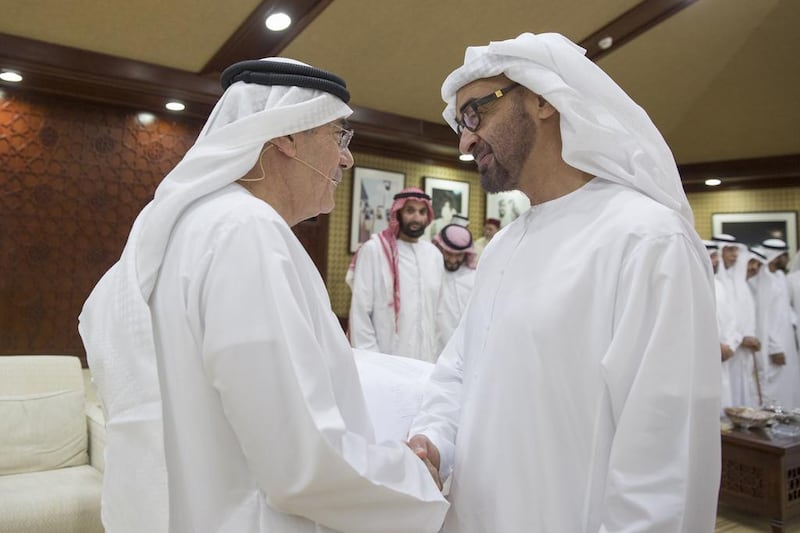From the admiration of his people to his belief in progression, guests at Wednesday evening’s Sheikh Mohammed bin Zayed majlis were given an insight into the founding President, Sheikh Zayed.
The country’s early years were recounted by Sheikh Zayed’s chief interpreter, Zaki Nusseibeh, who was the focus of the fourth lecture in the series, which runs throughout Ramadan. Dr Nusseibeh, 69, moved to what is now the UAE in 1967, working as a journalist for several international newspapers and agencies before swiftly moving on to his new role, as interpreter for Sheikh Zayed, one year later.
Decades ago, the country’s future appearance would have seemed but a dream to residents and visitors, he said.
“It would’ve been impossible for anyone who arrived in Abu Dhabi in the 1960s, when Qasr Al Hosn was the only stone building there, to predict or even dream of such a miracle,” said Dr Nusseibeh during the lecture, entitled Abu Dhabi between Yesterday and Today: Personal Impressions.
Although the country’s growth was not without struggle, any crisis that came its way was dealt with by Sheikh Zayed, Dr Nusseibeh said. Before its formation, the future of the country was put under stress after the UK’s announcement that the Labour government would withdraw its security umbrella from the region before Abu Dhabi and its neighbours were capable of building their own security and political systems, he said.
“There were regional and international concerns over a security vacuum that could lead to the emirates dissolving as independent political units, which could have further augmented tensions in an already conflict-stricken region, but Sheikh Zayed did the undoable at the time. He built a modern state capable of providing welfare and protection for its citizens and contributing to the stability and the security of the region.”
Dr Nusseibeh also spoke of two historical misconceptions regarding the UAE.
“The first misconception was that Britain was behind the idea of forming the union, while, in fact, it was the late Sheikh Zayed who drove that historical endeavour despite many reservations from British officials regarding its success,” he said.
At the time, Dr Nusseibeh said, most internal and external players rejected the idea of the federation and tried to hinder it. Nevertheless, Sheikh Zayed, in no doubt about the union, was determined.
“The second misconception was that the bilateral agreement for union between Abu Dhabi and Dubai in 1968 paved the way to expedite the establishment of the union. It was only the starting point for a long and laborious journey that was at constant risk of failure, that Sheikh Zayed and the founding fathers struggled with.”
The guest speaker shared with the audience rare footage of Sheikh Zayed addressing thousands of Emiratis who followed him to the airport, one day, to show their support.
Dr Nusseibeh also shared anecdotes of his time with Sheikh Zayed, notably, when the duo, who were in Spain, watched Neil Armstrong land on the Moon in 1969. “Members of Sheikh Zayed’s entourage joked about it that it must have been some sort of joke, and he wasn’t pleased. He told them, that ‘Man is capable of everything with hard work and determination’.
“He’d be very proud to know of his countrymen’s Mars mission,” said Dr Nusseibeh, cultural adviser at the Ministry of Presidential Affairs.
The lecture was attended by members of the royal family including Sheikh Mohammed bin Zayed, Crown Prince of Abu Dhabi and Deputy Supreme Commander of the Armed Forces, Sheikh Saud bin Rashid Al Mualla, Ruler of Umm Al Quwain, Sheikh Saif bin Zayed, Deputy Prime Minister and Minister of Interior, Sheikh Hamdan bin Zayed, Ruler’s Representative in the Western Region, Sheikh Hazza bin Zayed, National Security Adviser, Sheikh Nahyan bin Zayed, chairman of the board of trustees of Zayed bin Sultan Al Nahyan Charitable and Humanitarian Foundation, Sheikh Nahyan bin Mubarak, Minister of Culture, Youth and Community Development, and other sheikhs, ministers, ambassadors and members of the media.
nalremeithi@thenational.ae






